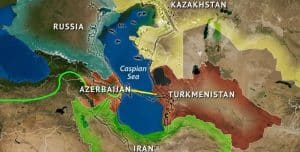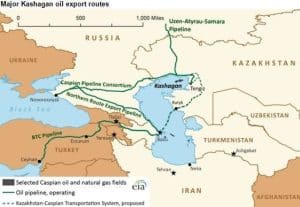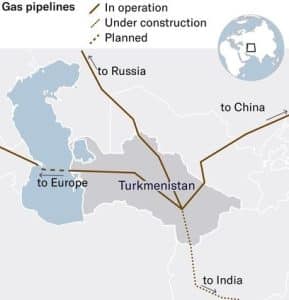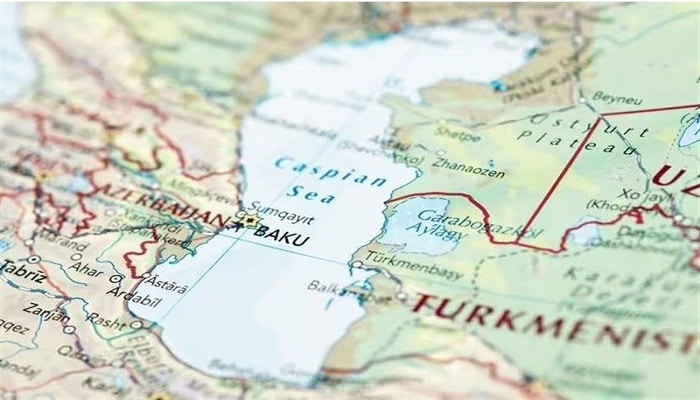PNN – The increase in geopolitical risks in the Caspian region and the possibility of adjusting the direction of the foreign policy of the Caspian border countries to the west create new challenges for Russia in terms of defending its interests and minimizing the negative impact of Western sanctions.
According to the report of Pakistan News Network, it seems that in 2024, due to the high volume of upcoming events, the Caspian Sea will become more and more the focus of Moscow’s regional policies, especially that the countries bordering this sea have adopted independent and sometimes Western policies in the energy and transportation sectors.
The geopolitical situation of the Caspian Sea can be conditionally divided into “before” and “after” February 2022. By early 2022, the situation in the region as a whole can be analyzed within the framework of stable trends that emerged after the collapse of the Soviet Union.
The negotiation process of the “Five countries bordering the Caspian Sea” regarding the legal status of this sea in 2018 ended with the signing of the convention and reached tangible and acceptable results. Regarding the architectural model of the new pipeline and the discussion on the routes of supplying hydrocarbon resources to foreign markets, it generally brought predictable results. The same applies to the development of shipping, military and other issues.
But after February 2022, when relations between Russia and the West deteriorated sharply due to the outbreak of war in Ukraine, the role of the Caspian region began to change rapidly. These changes can be clearly seen in the policies of each Caspian border country. This forced Moscow to find new approaches to implement its regional policies in the Caspian Sea, taking into account the current regional and global conditions.
Read more:
“Arab Street”; The consequences of ignoring the public opinion of the Arab world for the West
Looking for difficult decisions
The Caspian region has traditionally been one of the focal points of Russia’s regional policy. Historically, the Caspian Sea and its surrounding areas served as trade routes, and the main goal of Moscow’s policy in this area has been to ensure the security of transportation routes in this sea, as well as the development of shipping and fishing.
After the collapse of the Soviet Union, a new geopolitical situation emerged in the Caspian Sea region. This required Russia to formulate a new policy that includes not only the interests of the countries in this area, but also the geopolitical demands of extra-regional actors.
Russia has consistently defended its position on the international legal status of the Caspian Sea, opposed the presence of extra-regional forces here, and has also consistently supported measures aimed at protecting the marine environment.
To advance its strategic interests in this area, Moscow has benefited from various tools such as bilateral or multilateral alliances depending on the prevailing conditions in the region, thus Moscow was able to defend its position by maintaining partnerships in the region.
The result of the actions of the Kremlin and other countries bordering the Caspian Sea was the adoption of the Convention on the Legal Status of the Caspian Sea along with other countries in August 2018. This document was discussed for more than 20 years.
The negotiation mechanism, which consisted of meetings of the special working group, conferences of foreign ministers and summits of the countries bordering the sea, made it possible to bring closer the positions and resolve the conflicts among the “five countries” neighboring this sea.

Russia was able to include a number of basic provisions that it was interested in in this convention, but it did not eliminate the most important challenge of the Kremlin, which was the possibility of extra-regional countries influencing the policies of the countries bordering this sea.
Since the 1990s, Western countries have promoted alternative routes for the export of hydrocarbon resources that should not pass through Russian territory. Some of the proposed projects, such as the Baku-Tbilisi-Ceyhan oil pipeline and the Baku-Tbilisi-Erzurum gas pipeline, were implemented, while others remained only on paper.
For example, Western governments, primarily the United States and the European Union, have consistently promoted the idea of implementing the Trans-Caspian pipeline, which would run from Turkmenistan and Kazakhstan along the bottom of the Caspian Sea to Azerbaijan.
Some Caspian border countries, in turn, welcomed the activity of Western countries and considered this as an opportunity to attract support and create conditions for attracting investment. From the point of view of some of these governments, extra-regional countries were seen as attractive partners with whom many hopes were placed to solve economic problems.
The development of commercial and economic cooperation between Russia and the countries of the Caspian Sea was taking place in the context of increasing competition between the five countries bordering this sea in the field of goods transportation.
All the countries along the Caspian Sea have modernized their infrastructure, which has made it possible to increase the volume of cargo supply in this region. At the same time, Caspian Sea countries tried to participate more actively in global infrastructure projects. In particular, their attention has been drawn to the project of supplying goods from China to the European market (East-West Corridor).
New situation, new challenges
The geopolitical situation in the Caspian Sea began to change dramatically after February 2022, when Russia began its operations. Since the West has not been able to use its tools to influence Russian politics and undermine Russia’s economic potential, the United States and the European Union have expanded the geography of their sanctions policy.
In addition to Russia, Moscow’s partners were also included in the circle of these threats, especially the political pressure against the countries of the Caspian Sea intensified by being pressured to accompany the sanctions policy against Russia.
Despite increasing pressure on Russia and its partners, the Caspian Sea countries continued to discuss the region’s problems. In addition, issues have accumulated that require the participation of regional leaders.
As a result, in June 2022, the sixth summit of Caspian border countries was held and the Russian side emphasized the importance of solving all regional problems within the framework of agreements between the five countries and creating conditions for sustainable development. Also, Moscow had to quickly create and implement mechanisms to reduce the negative impact of Western sanctions.
The reflection of these policies manifested itself in the expansion of commercial and economic cooperation with the countries of the Caspian Sea, and therefore the second Caspian Economic Forum was held in 2022 with the aim of resolving issues related to commercial and economic interactions and the implementation of transportation and energy corridors. At the forum, Moscow strongly promoted the creation of new transport and logistics routes and the North-South International Transport Corridor project.
A tight knot of problems
In 2024, Russia is facing the hostile policies of Western countries with the aim of reducing this country’s influence in the Caspian region, through investing in transportation and energy routes in order to change the foreign policy vector of the Caspian border countries to the west. Therefore, the numerous visits of representatives of the European Union and the United States should be analyzed in order to influence the political leadership of the Caspian Sea countries and encourage them to support anti-Russian policies.
The energy factor will continue to be the main focus of the extra-regional governments’ policies in the Caspian Sea area. Policies that are promoting new architectural ideas of hydrocarbon resource supply in this region.
Promoting alternative routes for supplying oil and gas to Europe from a route other than Russian soil has become one of the major concerns of Western countries. In fact, the West, ignoring the technical problems and production capacity, leads the Caspian Sea countries to support new routes for the export of hydrocarbons.

Tengiz oil field of Kazakhstan
In this connection, we can talk about the expansion of the Trans-Caspian international transport route, of which Kazakhstan and Azerbaijan are important partners. In 2023, Kazakhstan began the test supply of oil from the Tengiz field on the Tengiz-Aktau-Baku-Ceyhan route, and then in January-February 2024, Kaz Trans Oil Company will supply 1,000 tons of Kazakh oil from the Tengiz field on the pipeline route.
This multimodal transportation included the use of pipelines as well as rail and sea transportation. However, this route needs to develop its own infrastructure. Expanding supply to China is also associated with high costs. Despite Kazakhstan’s steady export of oil to Russia, the country that hosts most of Kazakhstan’s oil exports, Kazakhstan is seeking to demonstrate its readiness to diversify its hydrocarbon export routes.

Galkenish oil field of Turkmenistan
Also, in the past months, Azerbaijan, Kazakhstan and Turkmenistan have significantly expanded their political relations with Western countries in various fields. Active interaction with representatives of the military and foreign policy departments of the European Union and the United States and cooperation on a wide range of issues shows the rapid change in the foreign policy foundations of these countries.
Iran
The aggressive policy of the West forces Russia to pay close attention to the route of the Caspian Sea. Therefore, in the current situation, Moscow’s priority is the completion and implementation of the North-South International Transport Corridor project.
In the conditions of increasing pressure of sanctions, which at the current stage has become an irreversible and unprecedented scale, the Caspian infrastructure projects can provide a “window” of new opportunities for Russia.
The increase in geopolitical risks in the Caspian region and the possibility of adjusting the direction of the foreign policy of the Caspian border countries to the west create new challenges for Russia in terms of defending its interests and minimizing the negative impact of Western sanctions.

